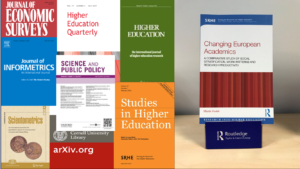Marek Kwiek had an opening lecture in a Lecture Series “Science of Science in the Spotlight” at the University of Luxembourg:
“Inequalities in Science: A Study of Major Collaboration Types” on February 24, 2021.
Link to the lecture is here.
Full lecture of 90 minutes (with discussion) is available on YouTube here: https://youtu.be/Dpzeh3xTO5o?t=857


He also hold a seminar for MA and doctoral students before the lecture (and recorded answers to their 30+ questions!).
Science of Science in the Spotlight (SciSci) is committed to provide a forum for multidisciplinary research exchanges in the field of Science of Science in Luxembourg through international collaborations with leading experts from complementary cognate research fields and disciplines.
In the highly competitive global science, publications are a major determinant of successful academic careers. Academic reputation comes almost exclusively from publications, just as social stratification in science is largely publication based. Individual scientists make collaboration decisions: choosing team or solo publications? Choosing same-sex or mixed-sex collaborations? Choosing local, national or international collaborations? Past authorship decisions bear on the availability of future external research grants, getting hired or tenured. Research funding agencies and hiring committees may favor publications in top journals, publications written in international collaboration, or single-authored publications. Publishing with scientists of the same gender is easier but does it lead to academic success? Collaboration supports promotion – but is it national or international collaboration? Finally, in solo research there is no ambiguity in credit allocation, no errors in signals about scientists’ research abilities. All in all, inequalities in science result also from the various collaboration types. We examined (1) local-national-international collaboration, (2) solo-team collaboration, and (3) male-female collaboration of all internationally visible (25,000) Polish university professors based on their 160,000 Scopus-indexed articles. We merged a national registry of 100,000 scientists (with full administrative and biographical data) with the Scopus publication database of 400,000 publications. We examined the propensity to conduct national/international collaboration, team/solo research, and same-sex/mixed sex collaboration across male-dominated, female-dominated, and gender-balanced disciplines. Having an integrated biographical, administrative, publication, and citation database at our disposal (“The Polish Science Observatory”), we examined the propensity to engage in the various collaboration types and we used several new variables. We draw conclusions from a single-nation context to academic science in general – and discuss practical implications of our research for academic careers.





